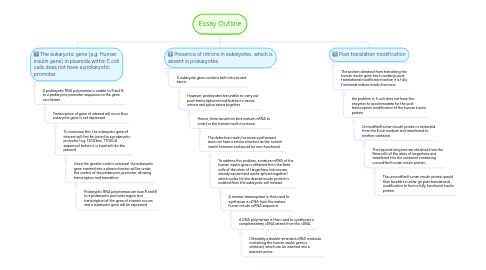
1. The eukaryotic gene (e.g. Human insulin gene) in plasmids within E.coli cells does not have a prokaryotic promoter
1.1. A prokaryotic RNA polymerase is unable to R and B to a prokaryotic promoter sequence on the gene on interest.
1.1.1. Transcription of gene of interest will occur thus eukaryotic gene is not expressed
1.1.1.1. To overcome this, the eukaryotic gene of interest will first be joined to a prokaryotic promoter (e.g. TATA box, TTGACA sequence) before it is inserted into the plasmid
1.1.1.1.1. Since the genetic code is universal, the eukaryotic gene inserted into a plasmid vector will be under the control of the prokaryotic promoter, allowing transcription and translation.
2. Presence of introns in eukaryotes, which is absent in prokaryotes.
2.1. A eukaryote gene contains both introns and exons.
2.1.1. However, prokaryotes are unable to carry out post-transcriptional modification to excise introns and splice exons together.
2.1.1.1. Hence, there would not be a mature mRNA to code for the human insulin hormone.
2.1.1.1.1. The defective insulin hormone synthesized does not have a similar structure as the normal insulin hormone and would be non-functional.
3. Post translation modification
3.1. The protein obtained from translating the human insulin gene has to undergo post translational modification before it is fully functional mature insulin hormone.
3.1.1. the problem is, E.coli does not have the enzymes to accommodate for the post transcription modification of the human insulin protein.
3.1.1.1. Unmodified human insulin protein is extracted from the E.coli medium and transferred to another container.
3.1.1.1.1. The required enzymes are obtained from the Beta cells of the islets of langerhans and transfered into the container containing unmodified human insulin protein,

